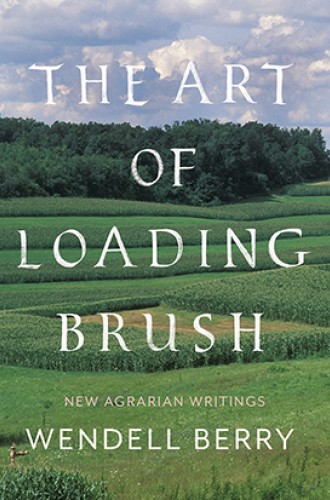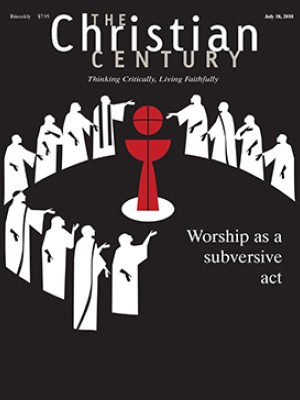How Wendell Berry helps us negotiate our post-agrarian condition
Something is lost when we no longer know the art of filling a wagon.
When I first read Wendell Berry’s parabolic novels, I began to notice the recurring word place. His characters demonstrate that a healthy life is all about place: specifically, having a farm to honor, love, respect, and care for.
In Berry’s world that agrarian perspective is in profound tension with industrial agriculture’s ways and means.
This collection of essays is part lament for what is being lost as industrial practices crowd out agrarian ones, part advocacy for a recovery of prior values, and part testimony to the difference that can be made by the wise exercise of land care.
He acknowledges at the outset that the original Southern Agrarians (the movement included Robert Penn Warren, Allen Tate, and John Crowe Ransom) had some culturally inherited racism (which they later repudiated). He allows, moreover, that growing tobacco as the major crop—a practice in which his own family was long invested—was not the best choice. Yet he insists that much is to be learned from the way tobacco farmers managed their land and their economy. Their way of life respected the land’s needs and demands and was rooted in dependence upon neighborly interaction. They eschewed exploitation of the land and refused to engage in greedy competition with neighbors.
Read our latest issue or browse back issues.
With a trace of nostalgia, Berry grieves the loss of viable communities centered on towns that looked after their own. This Jeffersonian model that he cherishes has been displaced by a ruthless, greedy monetization in which farmers have lost the capacity to farm wisely and everything has been reduced to commoditization.
In tracing this condition, Berry is equally dismissive of conservatives and liberals. Both groups show indifference to the specificity of farm life and the soil upon which food provision depends. Conservatives like Secretary of Agriculture Ezra Taft Benson in the 1970s follow the mantra, “Get big or get out.” Liberals, though concerned about “global warming and the environmental crisis,” are flyover advocates who never touch the actual earth that generates our food.
These are not new themes for Berry, but he voices them here with the passion and wisdom of an old man who knows enough to be discouraged and alarmed. In “Leaving the Future Behind: A Letter to a Scientific Friend,” Berry assaults a scientism that imagines it can use the past to predict and control the future. Such flat certitude makes no room for surprise or the emergent quality of life, Berry contends, and no openness to “weighted possibilities.” This arrogance, contemptuous of faith, operates with the illusion of limitlessness. It fails to see that the art of “provision” consists in taking good care of the resources that fund our futures.
“The Presence of Nature in the Natural World” (with footnotes) is the longest and most learned essay in the collection. Here Berry reaches back to Geoffrey Chaucer, Edmund Spenser, and the 12th-century poet Alan of Lille—all of whom had high regard for the liveliness of nature as a generative presence. This analysis morphs into vigorous advocacy for wise farming, respect for “the genius of place,” and an argument for what Berry calls the laws of diversity and frugality. A farmer must rotate crops in order not to exhaust the soil. Diversity, moreover, includes animal stock—cows, pigs, and chickens. Frugality involves taking care to preserve, value, and recycle resources so as not to use up the precious capacity of farm life. These two laws directly contradict the common practices of large-scale agribusiness, which cares only for limitless productivity in the profitable service of self-indulgent consumerism.
A fresh note in this collection is Berry’s disclosure of a personal side of the story he has long been telling. In particular, he reveals—as many have suspected—that Andy Catlett, a prominent figure in his novels, is a stand-in for the novelist himself. “A Long Ancestry” reviews the defining features of viable farm life. Making reference to Psalm 128, Homer’s Odyssey, Jeremiah 28, and Shakespeare’s As You Like It, Berry (via his surrogate, Andy) argues such a life is grounded in face-to-face neighborliness. “The word ‘neighbor’ carries the whole radicalism of the Christian Gospels, but Andy did not learn about the radical economy of neighborliness in church. He learned it from the friends he worked with and listened to.”
The title essay, “The Art of Loading Brush,” gives an amusing but serious account of Andy’s employment of a neighbor boy, Austen Page, a music student home for the summer, who is recruited to help clean up a mess of brush. The boy means well, but he loads the brush carelessly, so it fills the wagon too quickly. Andy explains to Austen that there is an art to loading brush. The loader must pay attention to each limb so that all the brush can fit on one wagon load. Such a quotidian art, Andy declares, is not “optional.” It must be learned and practiced. He tells the student: “In my opinion, if the art of loading brush dies out, the art to making music finally will die out too. You tell your professors, when you go back, that you met an old provincial man, a left over, who told you: No high culture without low culture, and when low culture is the scarcest it is the highest. Tell ’em that.”
The cumulative force of these lyrical essays takes the reader’s breath away, as if we have relearned something essential that contradicts the world all around us. That effect, of course, is just what Berry intends. There is no reason to think that this is Berry’s last book, but it has a ring of finality to it. Here is a man deeply rooted, wisely aware, offering a manifesto of weighty moral passion. He exposes the counterfeit quality of our dominant life and summons us to know and live differently.
A version of this article appears in the print edition under the title “The post-agrarian condition.”






